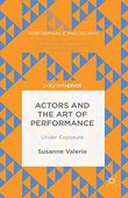Explore

Acting on stage is a mode of performing an action, in the context of which the bodily aspects implicitly at work in acting reveal their own significance and power. This event can actualize a wound incarnated in human beings, because the actor acts and does not act at the same time and hence the concept of being ‘the doer’ unmasks itself as being illusionary. One could call it a kind of ‘symbolic death’ (Mueller), an ‘anthropological mutation’ (Agamben)––an event of great interest because of its highly ethical call.The book “Actors and the Art of Performance. Under Exposure” opens with a cascade of contradictory motives for becoming an actor. But, if theatre is no longer understood as a theatre of representation, then what takes place on stage is a transformation at play with truth, in which ethics are realized by the aesthetic. Insofar the book summarizes the attempt to explore and map guidelines of acting as being under the perspective of be-coming. That may sound fairly harmless in theory, but it feels anything but harmless when you experience it on your own body. For example, for being physical under exposure actors have to learn that there exists no fundamental dualism between mind and matter. Furthermore, actors are espoused to a dynamic shifting ground in the name of creativity. They have to carry the burden that the self is no sovereign identity as we generally suppose, but rather a threshold of permanent be-coming. One could call it the outstanding gift of acting. In the German language, gift means “poison”, in German ears the word has the double meaning of poison and present, thus expressing the fact that a gift is disturbing and blessing at the same time. Loaded with fear and joy as the crucial point of acting, which attacks and attracts actors and spectators most.
Wird Theater nicht mehr als Repräsentation verstanden, werden im „Spiel mit der Wahrheit“ eine Fülle von Fragen über den Vollzug und das Ereignis unseres Daseins provoziert, die in einem ethischen Anspruch im Ästhetischen münden. Das klingt in der Theorie harmloser als es seinem physischen Ereignis nach ist. Denn der schöpferische Akt katapultiert SchauspielerInnen in eine Zone zwischen aktiv und passiv, in der sie nicht mehr alleinige Täter und souveräne Subjekte ihres Spiels sind.
This book is included in DOAB.
Why read this book? Have your say.
You must be logged in to comment.
